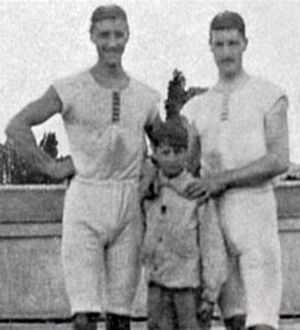François Brandt facts for kids

François Brandt (left), Roelof Klein and their coxswain at the 1900 Olympics
|
|||||||||||
| Personal information | |||||||||||
|---|---|---|---|---|---|---|---|---|---|---|---|
| Born | 29 December 1874 Zoeterwoude, Netherlands |
||||||||||
| Died | 4 July 1949 (aged 74) Naarden, Netherlands |
||||||||||
| Sport | |||||||||||
| Sport | Rowing | ||||||||||
| Club | Laga, Delft | ||||||||||
|
Medal record
|
|||||||||||
François Antoine Brandt (born December 29, 1874 – died July 4, 1949) was a talented rower from the Netherlands. He became famous for his amazing achievements at the 1900 Summer Olympics held in Paris, France. Brandt was part of a Dutch rowing team that made history by winning two Olympic medals.
Contents
Becoming an Olympic Rower
François Brandt was a dedicated athlete who loved the sport of rowing. He trained hard to compete at the highest level. His skill and teamwork led him to the 1900 Summer Olympics in Paris. This was a huge event where athletes from all over the world came together to compete.
A Bronze Medal in the Eight
At the Paris Olympics, François Brandt was a key member of the Dutch team competing in the men's eight event. This race involves a large boat with eight rowers and one person called a coxswain. The coxswain steers the boat and helps the rowers stay in sync.
The Dutch team, with Hermanus Brockmann as their coxswain, rowed with great effort. Their hard work paid off! They managed to win a bronze medal for the Netherlands. This was a fantastic achievement for the team.
A Golden Idea for the Coxed Pair
Brandt also competed in another event: the coxed pair. This boat has two rowers and a coxswain. François Brandt teamed up with Roelof Klein for this race. In their semifinal, they raced against a French team. Unfortunately, they lost this race.
Brandt and Klein realized that their coxswain, Hermanus Brockmann, weighed 60 kilograms (about 132 pounds). They thought this weight might be slowing their boat down. So, they came up with a clever plan! They decided to find a lighter coxswain for the final race.
Finding a New Coxswain
They found a young French boy who was much lighter, weighing only 33 kilograms (about 73 pounds). This boy was a local and agreed to help them. With their new, lighter coxswain, Brandt and Klein felt they had a better chance.
In the final race, the change made a big difference. The Dutch pair rowed incredibly well and narrowly beat the French team. They won the gold medal! This was an amazing and unusual victory, showing how smart thinking can help in sports.
Life After the Olympics
After his incredible Olympic success, François Brandt continued to lead an interesting life. He didn't just focus on sports. He was also very smart and studied hard.
A Career in Engineering
Brandt earned a degree in civil engineering. This means he learned how to design and build things like roads, bridges, and buildings. He used his skills to work for the Dutch railways. He worked there for many years, until 1938, helping to build and maintain the country's train system.
Becoming a Bishop
Later in his life, François Brandt chose a different path. He became a bishop for the Liberal Catholic Church in Belgium and the Netherlands. A bishop is a high-ranking leader in some Christian churches. This shows that he was a person with many different interests and talents, both in sports and in his professional and spiritual life.
 | Charles R. Drew |
 | Benjamin Banneker |
 | Jane C. Wright |
 | Roger Arliner Young |

